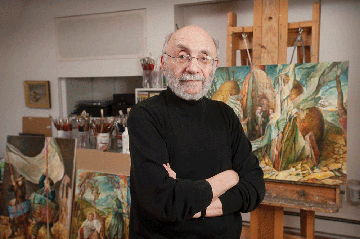On March 5, Bak will give a presentation of his work at 7 p.m. in Vanderslice Hall at the Kansas City Art Institute, 4415 Warwick Blvd, Kansas City, Mo. That event, which is free and open to the public, is co-sponsored by the Kansas City Art Institute and Congregation Beth Shalom.
Samuel Bak’s appearance in Kansas City is made possible by the Kansas City Art Institute; the Rabbi Gershon Hadas Memorial Lecture, a program of Congregation Beth Shalom; Jewish Federation; Jewish Community Center; and the Tzedakah Fund at Combined Jewish Philanthropies of Boston.
The art of Samuel Bak weaves together personal and Jewish history to articulate an iconography of his Holocaust experience and his perceptions of a world that lives in the shadow of the crematoria chimneys. Across seven decades of artistic production, Bak has explored and reworked a set of metaphors, a visual grammar, and vocabulary that ultimately poses metaphysical questions. His art depicts a world destroyed, and yet provisionally pieced back together. “As I was a witness to this darkness, my art chose to mirror it. But it always speaks for the Hebrew word tikkun ‘repair’ as well” he says. “I hope, I have grandchildren.”
Bak was born in 1933 in Vilna, Poland, to an educated, cultured, middle-class family. As Vilna came under first Soviet and then German occupation in the early 1940s, Bak and his family, along with the other Jews, were moved to the Vilna Ghetto. It was there, at the age of 9, that Bak had his first exhibition of drawings. His family was then sent to a labor camp, from which he and his mother were smuggled out and given refuge in a Benedictine Convent. Of the 55,000 Vilna Jews, fewer than 2,500 survived. He and his mother were the only members of his extended family to survive.
After three years in a Landsberg Displaced Persons Camp in Germany, Bak immigrated to Israel, where he studied at the Belzalet Art School in Jerusalem. In 1956, he moved to Paris to continue his studies at the Ecole des Beaux-Arts, and subsequently lived in Rome, New York City, Switzerland and since 1993, outside of Boston, Mass., where he became an American citizen. Since 1959, the artist has had numerous exhibitions in major museums, galleries and universities throughout Europe, Israel, South Africa and the United States. Bak has been the subject of numerous articles, scholarly works and 15 books. In 2001, he published his touching memoir, “Painted in Words,” which has been translated into several languages. He has been the subject of two documentary films and was the recipient of the 2002 German Herkomer Cultural prize. Samuel Bak has received honorary doctorate degrees from the University of New Hampshire, Seton Hall College and this coming May, the Massachusetts College of Art.
The artist and his wife, Josée, together with Bernie and Sue Pucker, donated the paintings for the ILLUMINATIONS exhibition to Facing History and Ourselves, an international educational organization based in Brookline, Mass., whose mission is to engage students and adults of diverse backgrounds in an examination of racism, prejudice and anti-Semitism in order to promote the development of a more humane and informed citizenry.{/mprestriction}




